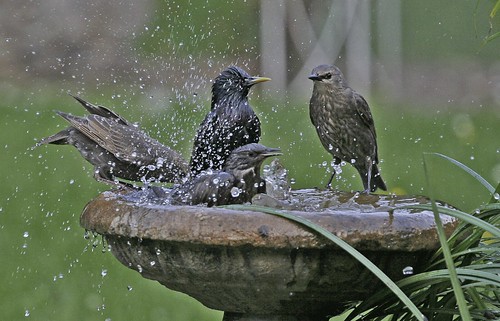Reflexive German Verbs Posted by Constanze on Jan 17, 2018 in Grammar, Language
Guten Tag! Today we’re going to look at reflexive German verbs. If you’ve ever heard a German native say something like “I will shower me” in English instead of “I will take a shower”, for example, this post on reflexive verbs will hopefully explain why that is!

sich baden – to bathe/wash oneself. Photo “20070610_bird-bath” by natjulien on flickr.com under a CC license (CC BY 2.0)
What is a reflexive verb?
A reflexive verb is one that has a pronoun that refers back to the subject of the sentence. Or, to put it simply, instead of just saying “I shower”, as you would in English, in German you add “myself” to show that you are doing this action to yourself. So instead of “I shower” you’d say “I shower myself”.
What do reflexive verbs look like in German?
Reflexive verbs all begin with the word sich. Sich rasieren, for instance, is a reflexive verb meaning to shave (oneself). This, with the word sich in front, is how you’d see a reflexive verb in its root form.
Forming a reflexive verb
The ‘myself’ bit is called the reflexive pronoun, and this changes according to who you are talking about.
Using the reflexive verb sich rasieren (to shave) as an example again, here is how you’d form it in the present tense:
Ich rasiere mich – I shave
Du rasierst dich – You shave
Er/sie/es rasiert sich – He/she/it shaves
Wir rasieren uns – We shave
Ihr rasiert euch – You shave (plural)
Sie/sie rasieren sich – You (formal)/they shave
Which German verbs are reflexive?
Here is a list of some common, reflexive German verbs. Please note that some of these verbs have different meanings when used without the ‘sich’ – ie. when they are not reflexive.
Sich anziehen – to get dressed
Sich baden – to bathe, take a bath
sich beeilen – to rush, hurry
sich bewegen – to move
sich duschen – to take a shower
sich entscheiden – to decide
sich erkälten – to catch a cold
*A classic mistake often made by English speakers learning German is that they say “Ich bin erkältet” to mean “I caught a cold/am ill” when really it is reflexive, so should be “Ich habe mich erkältet”. This is a strange one because it sounds as if you have brought the cold on yourself! I like to translate this one literally as “I have colded myself”.*
sich freuen – to be glad, excited
sich rasieren – to shave
sich schminken – to put makeup on
sich streiten – to argue
sich waschen – to wash
I hope this has been helpful!

Build vocabulary, practice pronunciation, and more with Transparent Language Online. Available anytime, anywhere, on any device.



